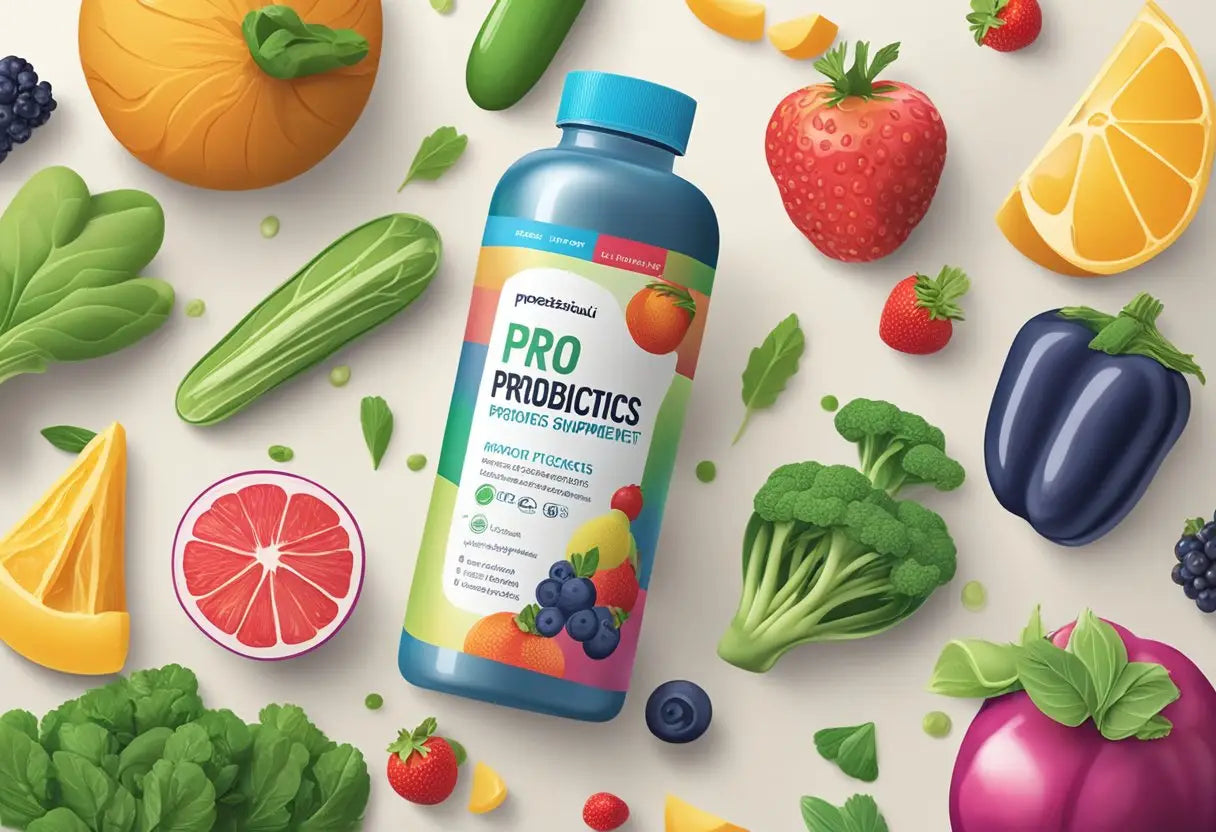
Probiotic Supplements: Unveiling Their Impact on Gut Health
Probiotic supplements are becoming a popular choice for individuals looking to support their gut health. These supplements contain live microorganisms, such as bacteria and yeast, which are intended to provide beneficial effects by improving the balance of the gut microbiome. A healthy gut microbiome is crucial because it plays a vital role in digestion, immune function, and overall well-being.
Since the human gut is home to a complex community of microorganisms, maintaining a balanced microbiome is essential. Probiotic supplements offer a convenient way to introduce specific strains of beneficial bacteria that may not be present in sufficient quantities in the diet. These beneficial bacteria can help outcompete harmful bacteria, potentially leading to improved gut health and a better digestive system.
While research continues to explore the extent of benefits provided by probiotic supplements, it is clear that they can be a valuable tool in managing and preventing various gastrointestinal issues. It is important for individuals to choose the right type of probiotic based on their specific health requirements, as the effectiveness of these supplements can depend on the strains included and the overall quality of the product.
Understanding Probiotics
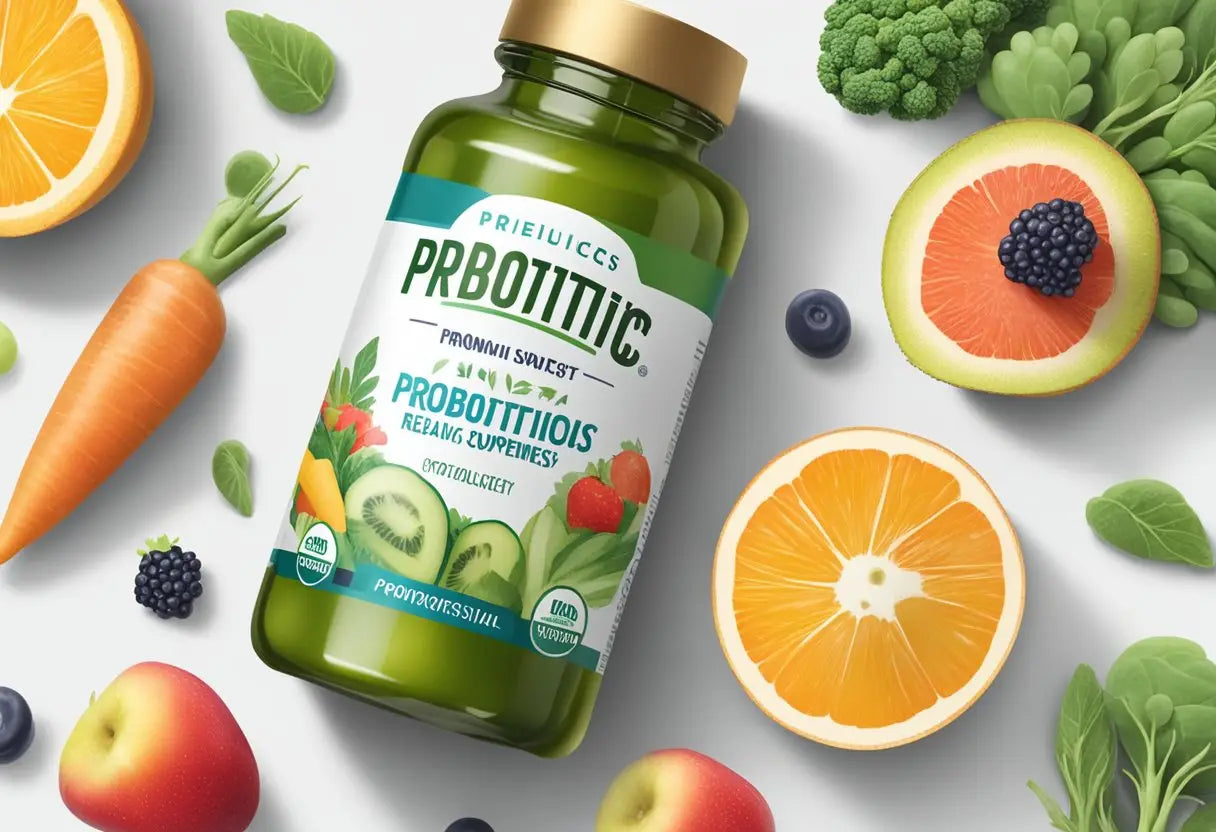
Probiotics are live microorganisms, primarily bacteria, which when administered in adequate amounts, confer a health benefit on the host. They are integral to the balance and functioning of the gut microbiome.
Fundamentals of Probiotics
Probiotics are composed of various strains of bacteria that beneficially interact with the body’s own microbes. These beneficial bacteria are commonly found in fermented foods and as dietary supplements. The primary genera of probiotic bacteria are Lactobacillus, Bifidobacterium, and Bacillus. Each of these genera include numerous different species, and within those species, different strains can be found.
Types of Probiotic Strains
Several strains of probiotics exist, each with distinct health benefits. For instance:
- Lactobacillus strains are often associated with the improved digestion of lactose.
- Bifidobacterium may help alleviate symptoms of irritable bowel syndrome (IBS) and other gastrointestinal disorders.
- Bacillus strains are spore-forming bacteria that can survive in harsher conditions and may enhance immune function.
Each strain plays a different role in promoting health, making the selection of a probiotic supplement specific to the individual’s need critical.
Role of Probiotics in Gut Health
The gut microbiome, a complex community of microorganisms living in the digestive tract, is essential for digestion, immune system function, and overall health. Probiotics contribute to this balance by influencing the composition and function of the gut microbiome. They compete with pathogenic bacteria for nutrition and attachment sites in the gut lining, produce substances that can reduce the pH of the environment making it less favourable for harmful bacteria, and can stimulate the immune system.
By helping to maintain a healthy balance of bacteria in the gut, probiotics play a fundamental role in preserving gut health and preventing dysbiosis - an imbalance harmful to the body’s systems.
Health Benefits of Probiotics

Probiotic supplements are renowned for their role in supporting digestive health and bolstering the immune system. Specific strains have been associated with a variety of health benefits, supporting not just the gut, but also influencing other areas of health, such as allergies and cholesterol levels.
Gut-Related Benefits
Probiotics contribute to the balance of the gut microbiota, which is essential for digestion and gut health. They are beneficial in managing conditions such as Irritable Bowel Syndrome (IBS), where they can ease symptoms like bloating and irregular bowel movements. In diseases like Ulcerative Colitis and Inflammatory Bowel Disease (IBD), probiotics may help manage inflammation and promote remission.
Probiotics and the Immune System
The gut is a major component of the immune system, and probiotics play a crucial role in its function. They can enhance the body's immune response, reducing the incidence or severity of allergies and respiratory infections. Probiotics aid in the production of natural antibodies and may also boost immune cells like the IgA-producing cells.
Other Health Improvements
Beyond the gut, probiotics have been associated with systemic health benefits. They may help in reducing cholesterol levels by breaking down bile in the gut, thus inhibiting its reabsorption. There's also evidence suggesting they could aid in managing obesity, through the modulation of gut bacteria which influences metabolism and weight.
Probiotic Foods Vs. Supplements
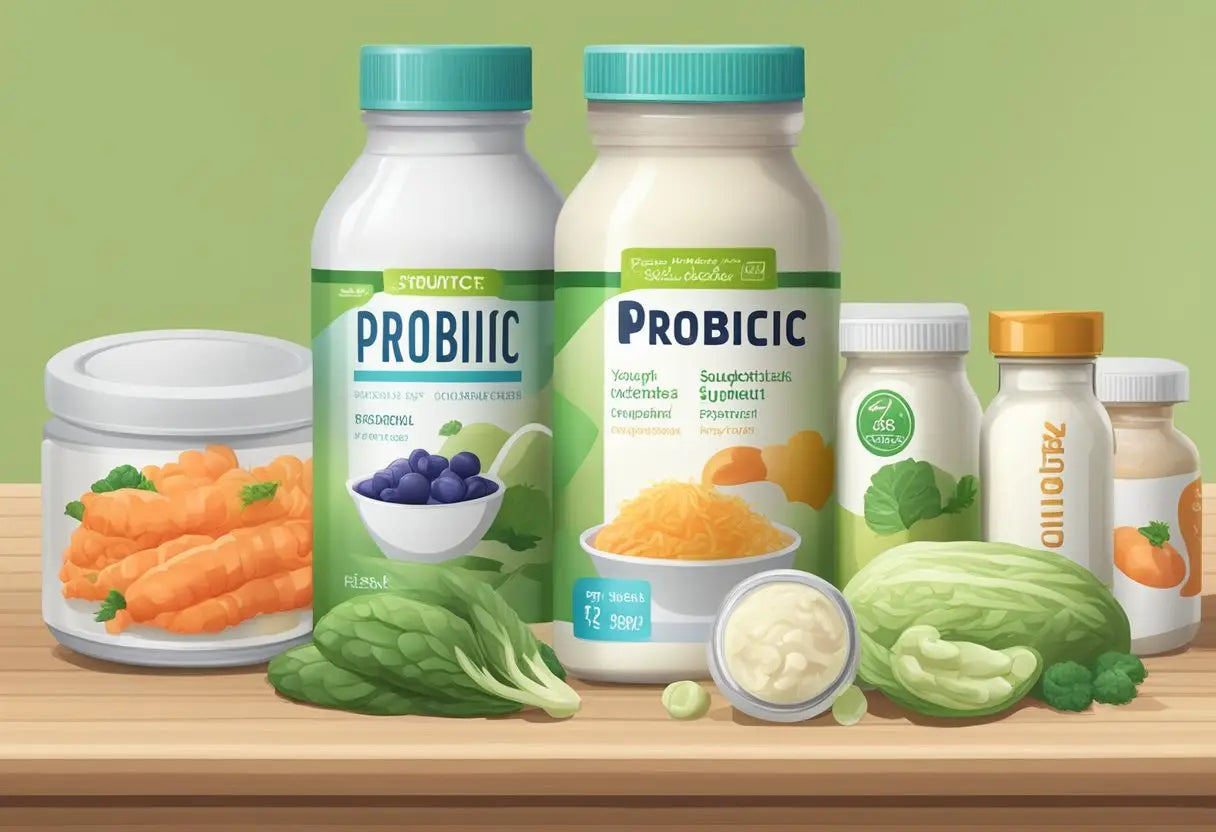
When considering probiotics, it is important to understand the benefits and differences between obtaining them from foods or in supplement form, such as capsules and powders. It's crucial to look for live microorganisms and be aware of CFUs (colony-forming units) when choosing probiotic products.
Common Probiotic Foods
Probiotic-rich foods tend to be fermented and include a variety of flavours and textures. Common examples include yogurt and kefir, which are dairy-based and can be consumed daily. Sauerkraut, a fermented cabbage, and kimchi, a spicy Korean variant, are vegetable-based options that also contain live cultures. These foods not only provide live microorganisms but also nutritional benefits from their ingredients, like fibre from cabbage.
Understanding Supplement Labels
Reading labels on dietary supplements is paramount. They should list the specific strains of bacteria, their CFUs at the time of manufacture, and expiry date to gauge potency. A reliable label will also include whether the product should be refrigerated to maintain the viability of the live microorganisms. Whether choosing capsules or powder forms, transparency in labelling reflects the quality of the probiotic supplement.
Choosing the Right Supplement
Selecting the right probiotic supplement requires considering personal health needs and the specific strains included. Some products are better for digestive health, while others may focus on immune support. For a targeted approach, it is useful to know that specific strains can provide particular benefits. Quality probiotics often include the CFUs guaranteed at the time of consumption, not just production, which can ensure efficacy until the expiry date.
Safety and Side Effects
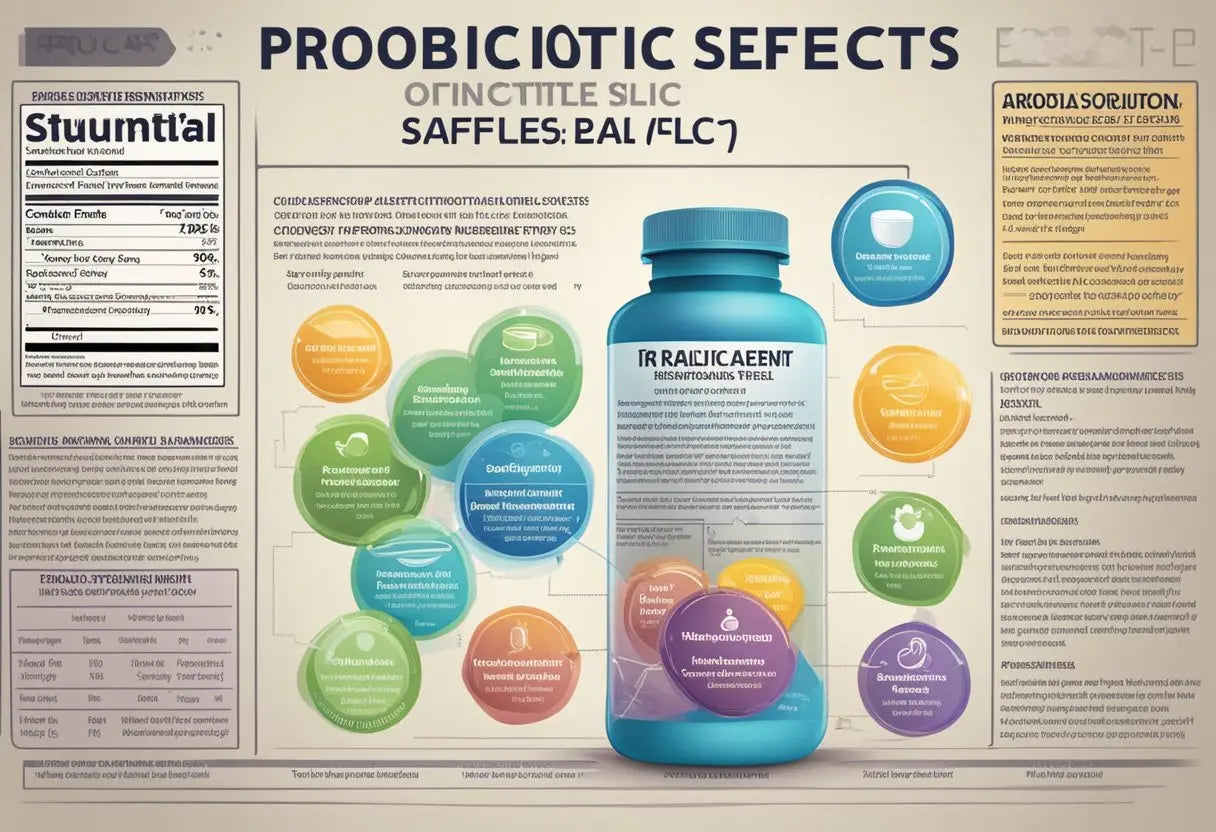
When incorporating probiotic supplements into one’s diet, it is essential to consider their safety and the potential side effects they may cause. Selecting reputable products and being aware of possible adverse responses are crucial steps for maintaining good health.
Recognising Safe Probiotic Supplements
To identify safe probiotic supplements, one should look for products that have been rigorously tested for quality and efficacy. It is advisable to choose supplements that detail the strains of bacteria used, as well as the number of organisms contained per dose. Reputable manufacturers often voluntarily undergo testing by third-party organisations and may feature a seal of approval, indicating that the product meets specific safety standards. The NHS guidance on probiotics can provide further insight into recognised safety parameters within the UK.
Potential Side Effects
Probiotics are generally considered safe for the majority of the population, but some individuals may experience side effects. Symptoms can range from mild digestive discomfort – such as gas and bloating – to more severe allergic reactions. The severity often depends on an individual's personal health condition and how their body responds to the introduction of these bacterial strains. Additionally, there is a risk of harmful effects in people with underlying health issues or compromised immune systems. As outlined by sources like Healthline, common side effects include temporary digestive symptoms, while rarer occurrences might involve the risk of infections. It is important for individuals to consult healthcare professionals, especially if they have a pre-existing health condition or are experiencing persistent symptoms after taking probiotic supplements.
Incorporating Probiotics into Your Diet

In the quest for a balanced gut microbiome, including probiotics in one's diet intelligently is crucial. Whether they are dealing with irritable bowel syndrome (IBS), looking for support post-antibiotics, or aiming to amplify their dietary benefits, individuals must consider proper dosage and usage of probiotics.
Dosage and Usage
The efficacy of probiotics is contingent upon adequate dosage and proper usage. A typical supplement may range from 1 to 10 billion CFUs (colony-forming units). Individuals should consult healthcare professionals to determine the appropriate dosage based on their specific health needs, including but not limited to, management of IBS or other gastrointestinal conditions.
Life After Antibiotics
Antibiotics can disrupt the gut flora, which is why incorporating probiotics post-antibiotic treatment is beneficial. Probiotics can aid in restoring the balance of beneficial bacteria. It’s recommended that individuals take probiotics a couple of hours after their antibiotic medication to avoid the antibiotics from neutralising the probiotics.
Probiotics and Diet Enhancement
Incorporating probiotics through one's diet can enhance overall gut health. Foods such as yogurt, kefir, sauerkraut, and kombucha are naturally rich in probiotics. For those unable to meet their requirements through food alone, probiotic supplements are an alternative, especially for those aimed at specific dietary enhancements or conditions like IBS.
Clinical Evidence and Research

Probiotic supplementation undergoes rigorous evaluation through clinical trials and research studies. These investigations are critical to understanding the effectiveness and safety of probiotics for various health outcomes.
Recent Studies on Probiotics
Recent research has indicated that probiotic supplementation can lead to the temporary rise in gut microbiota concentrations of supplement-specific bacteria. Specific strains have been evaluated for their impact on the immune system, stool consistency, bowel movement frequency, and vaginal lactobacilli concentration. For instance, a study referenced by PubMed supports the notion that probiotics may confer these health benefits in healthy adults.
Another significant area of research observed changes in the gut microbiome that may be related to micronutrient status. Conclusions from such studies suggest that probiotics could balance gut microbiota, which may impact the host's health beyond the digestive system. Experts in the field have highlighted these findings in detailed reviews.
Clinical Trials and Outcomes
Clinical trials are the gold standard for testing the efficacy of probiotics. These trials involve administering probiotics to one group and a placebo to another to observe measurable differences in health outcomes. A systematic review shared by the European Society for Primary Care Gastroenterology points to evidence gained from randomised controlled trials (RCTs) regarding the use of probiotics for specific lower gastrointestinal (GI) symptoms. The data, presented in a publication on PMC, help doctors make informed recommendations about probiotic use in management protocols.
While some clinical trials have found benefits for conditions like ulcerative colitis, the collective research indicates that probiotics should not be used routinely for certain other conditions, such as Crohn's disease, where no clear benefits have been established. Information aimed at healthcare professionals, such as that provided by the Office of Dietary Supplements, is pivotal in disseminating these outcomes to ensure evidence-based clinical practice.
Consumer Considerations

When choosing a probiotic supplement, consumers need to be aware of the quality, regulatory standards, and the importance of seeking professional advice. These factors are crucial in determining the efficacy and safety of the product.
Evaluating Probiotic Quality
Consumers should scrutinise the potency of probiotic supplements, noting the colony-forming units (CFUs) on the label. High potency usually refers to products containing billions of live organisms, which can indicate higher effectiveness. Reliable manufacturers will specify the strains of probiotics used, as certain strains are associated with specific health benefits. To verify claims, consumers may look at resources such as the Office of Dietary Supplements (ODS) which provide insights into various supplements.
Regulatory Aspects and Standards
While probiotic supplements are often marketed for their health benefits, they are not strictly regulated by the Food and Drug Administration (FDA) in the same way as pharmaceuticals. This lack of stringent oversight means products on the market may not have proven safety or efficacy. Therefore, checking if a product has undergone third-party testing can be a reliable indicator of quality. For more detailed reviews on regulations, consumers may refer to analyses by Consumer Reports.
Seeking Professional Advice
It's advised that individuals consult with a healthcare professional before starting any new supplement routine, especially if they have underlying health concerns or are taking other medications. Health professionals can offer tailored advice based on an individual's health history and current condition. In fact, the need for specific strains or CFU count can vary greatly from person to person, thus, a consultation ensures the consumer makes an informed decision.
Frequently Asked Questions
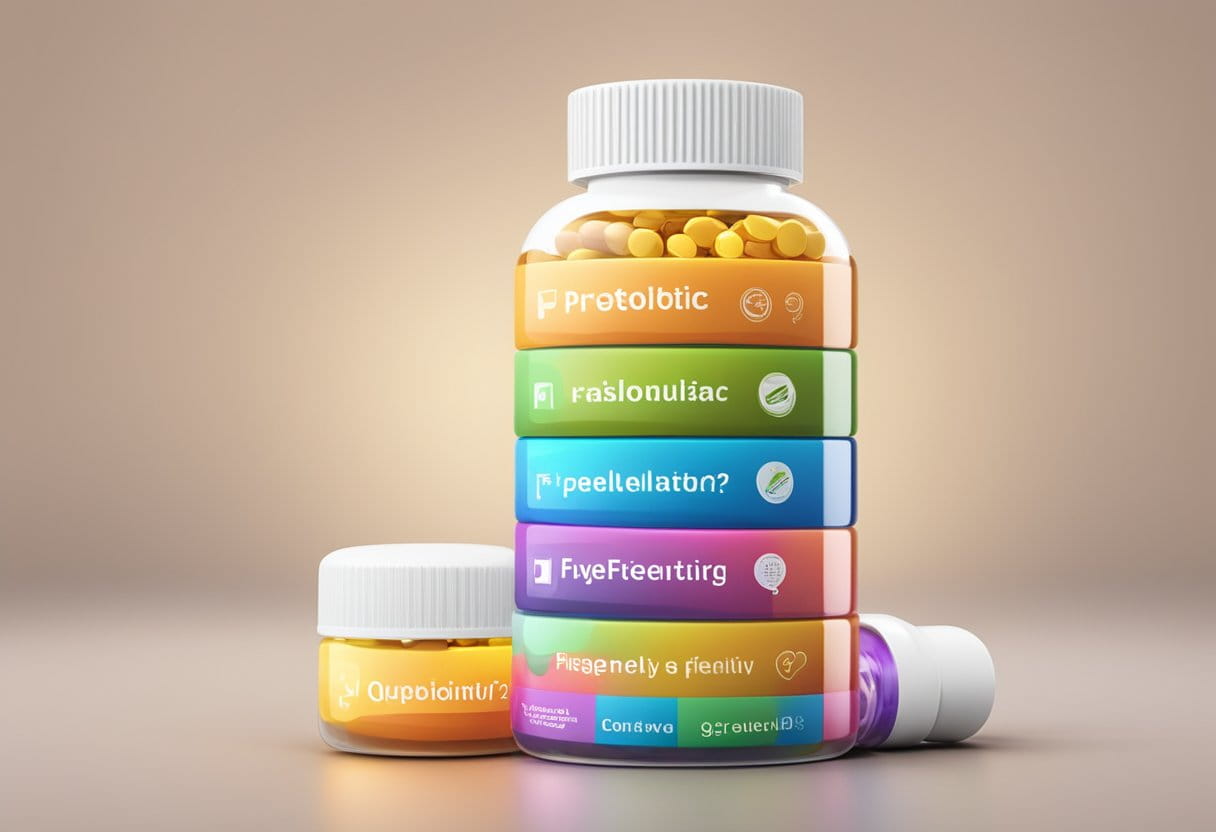
The section addresses common queries about probiotic supplements, delving into brands, health benefits, drinks, gut health improvement, tablets, and food sources.
Which brands of probiotic supplements are highly recommended?
There are numerous brands on the market, but it’s important to choose probiotic supplements that have been rigorously tested and have credible scientific support.
How can natural probiotics benefit one's health?
Natural probiotics, such as those found in yoghurt, help maintain a healthy balance of gut bacteria and can contribute to improved digestive health and immune function.
What are the advantages of consuming probiotic drinks?
Probiotic drinks can be a convenient way to ingest beneficial bacteria that may aid in digestion, enhance the absorption of nutrients, and support the immune system.
In what ways do probiotic supplements improve gut health?
Probiotic supplements introduce beneficial bacteria into the gut microbiome, potentially reducing symptoms of gastrointestinal disorders, such as irritable bowel syndrome.
What specific benefits do probiotic tablets offer?
Probiotic tablets can offer a precise dose of probiotics to help maintain the gut flora balance and can be especially beneficial for individuals with busy lifestyles.
Which foods are the richest sources of probiotics?
Fermented foods like sauerkraut, kimchi, and miso, as well as live-cultured yoghurt, are among the richest dietary sources of probiotics.

Leave a comment